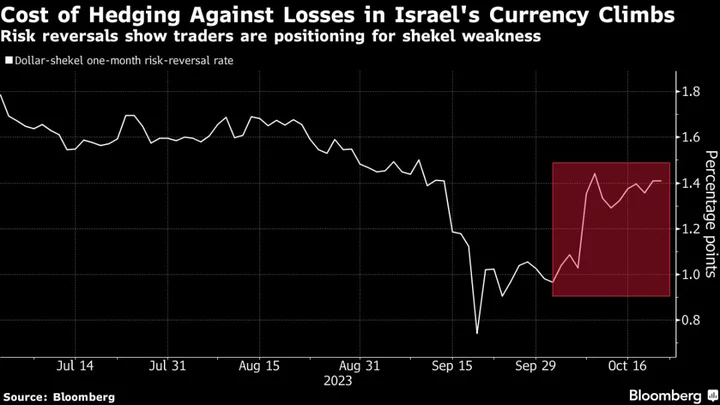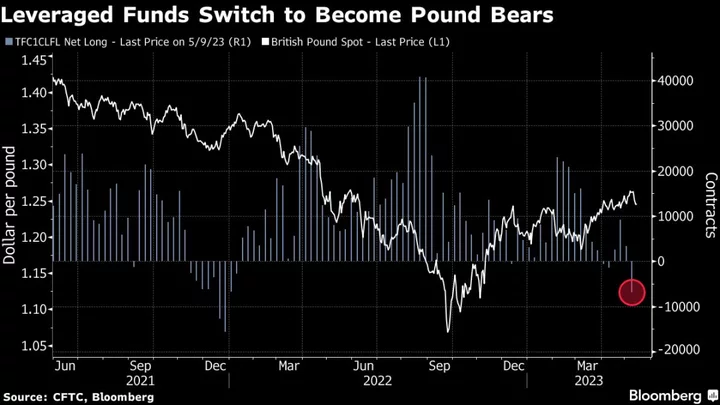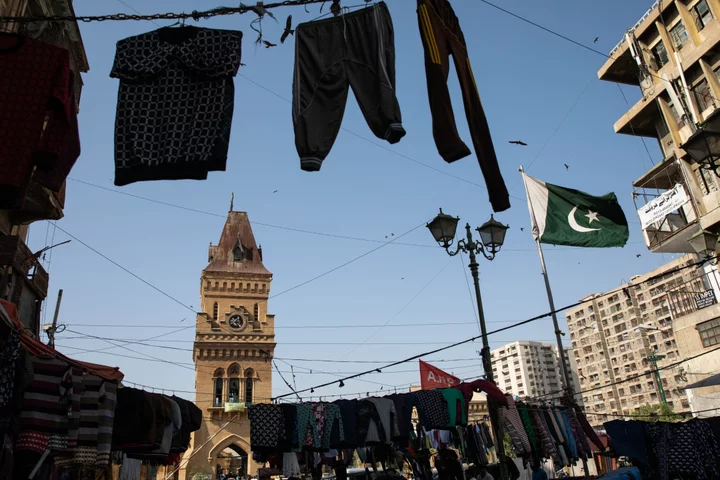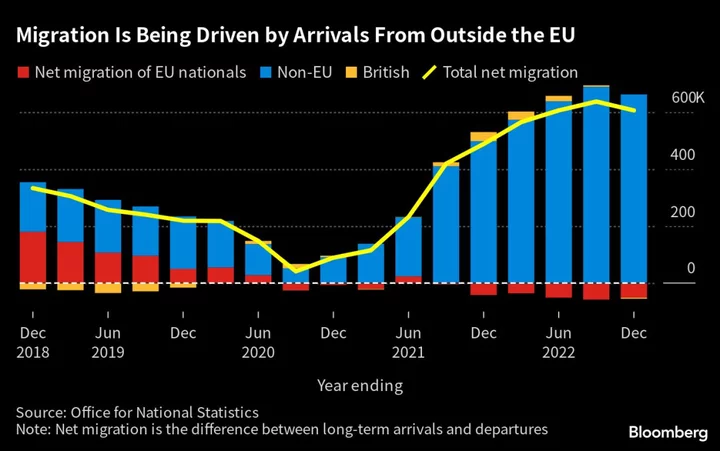Israel is staring down a currency market that’s succumbing to fears over the nation’s intensifying war with Hamas, in a standoff with traders that could determine the course of monetary policy this year and beyond.
With interest rates now at their highest since 2006, the shekel’s trajectory will shape the central bank’s role in an economy shifting to a war footing and in need of stimulus. The currency is already among the world’s worst performers this month despite a $45 billion package of emergency measures rolled out by policymakers soon after the deadliest attack the country has suffered in decades.
Though the Bank of Israel’s interventions tamed bouts of volatility that sent the currency sliding this week to levels unseen since 2015, options show investors are now getting even more bearish. The shekel has depreciated almost 6% this month, briefly trading on Friday at the weakest in over a decade.
“The shekel selloff can continue, especially as the general direction of the conflict seems to be escalating rather than deescalating,” said Brendan McKenna, a New-York based emerging-markets strategist at Wells Fargo Securities.
While the shekel’s declines first began months ago with the government’s controversial efforts to weaken the power of the judiciary, the shock of the conflict will likely send the currency sliding to as low as 4.15 per dollar, according to Wells Fargo. That would mark the weakest level since 2009.
The shekel traded around 4.05 per dollar on Friday, following a report by Moody’s Investors Service that said the country’s credit rating was at risk of being downgraded.
Bad Mix
“Rate cuts could compound shekel depreciation pressures and force additional Bank of Israel FX intervention — likely a combination the central bank will want to avoid,” McKenna said.
As Israel gears up for a ground offensive in Gaza after a week of intense shuttle diplomacy in the region, the depreciation will set the tone for the central bank as it reviews rates for the first time since the attack by Hamas on Oct. 7.
Ahead of Monday’s decision, Deputy Governor Andrew Abir said the monetary authority’s top priority was to steady the shekel, prompting analysts and traders to review their expectations that monetary easing could be in the cards.
Almost all economists surveyed by Bloomberg predict the central bank will leave its benchmark unchanged at 4.75%. It’s been on hold after July, following 10 hikes that started in early 2022 when rates were close to zero.
Looking further ahead, traders are pricing in as many as two quarter-point cuts in the coming six months. Lower rates would risk further eroding the appeal of Israel’s assets, with the nation’s 10-year yields already about 55 basis points lower than US Treasuries of similar maturity.
The stress of the war on the economy will probably keep monetary easing on the agenda in the months ahead, even as the conflict emboldens bets for a weaker shekel.
While not ruling out a small rate cut on Monday, Deutsche Bank AG strategists Christian Wietoska and Oliver Harvey said “the most likely scenario is a later start of the easing cycle.”
“It is very clear that domestic growth will be negatively impacted by the recent developments and absent any FX shock, it should lead to a sharp decline in inflation pressures over the upcoming months,” they said in a note. “This opens the door for aggressive easing.”
The extra cost to protect against shekel declines in the coming month — versus hedging against gains — has climbed to 1.4 percentage points on Thursday, from around a percentage point before the fighting started almost two weeks ago, risk reversals show.
Expected swings in the currency — as measured by one-month implied volatility — have jumped by the most worldwide since Hamas’s attack and Israel’s retaliatory strikes on Gaza.
BNP Paribas SA’s positioning model shows investors are holding net short positions in the shekel — though “not at extreme levels,” said Jerome Leibovici, a London-based strategist at the French bank.
“Should the Bank of Israel decide to cut at its upcoming meeting, this may introduce two-way risks for the currency,” despite its intervention program, Leibovici said.
Facing a weaker and more volatile currency, the central bank is devising measures of economic relief that includes steps such as delaying loan repayments for some borrowers.
Finance Minister Bezalel Smotrich meanwhile said the government is planning a wartime stimulus program “larger and wider” than the support provided to the economy during the coronavirus pandemic, with the budget deficit possibly widening this year to 3.5% of gross domestic product.
Morgan Stanley said the central bank is set to cut rates only in the first quarter to support the recovery, as it turns to other tools — for now — to contain any risks to financial stability.
“The currency has not displayed an extreme level of volatility thanks in part to the Bank of Israel’s commitment to supply US dollars to the market,” Morgan Stanley analysts including Georgi Deyanov and Alina Slyusarchuk said in a report. “A commitment to hold rates through to the January 2024 central bank meeting should support shekel too.”
--With assistance from Galit Altstein.
(Updates with shekel performance in third paragraph.)









